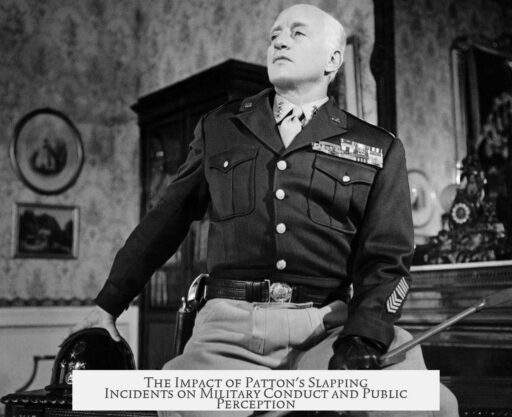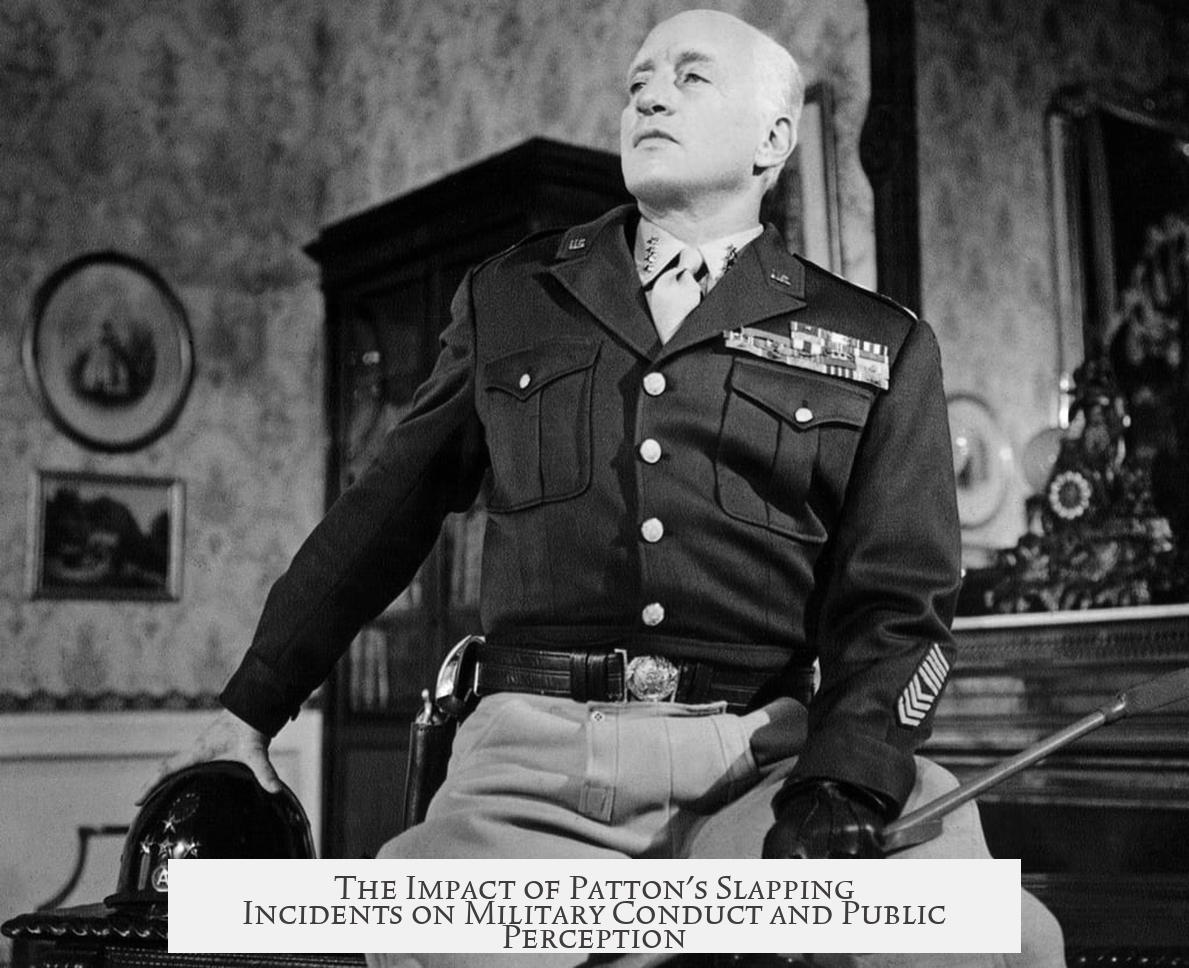The incidents of General George S. Patton slapping two soldiers during World War II became a significant issue due to the clash between his harsh views on combat stress and evolving understanding of soldier trauma, the public exposure of his actions, and the high military and political stakes involved.
On September 30, 1943, Pvt. Charles H. Kuhl, exhausted and medically fragile after days under artillery fire with his unit suffering massive casualties, was slapping by Patton at a hospital near Nicosia. Kuhl suffered from malaria, severe fatigue, and untreated wounds despite not reporting physical injuries. When Kuhl admitted fleeing combat due to inability to endure shelling, Patton struck him, accused him of cowardice, and ordered his removal from the hospital, refusing to allow “yellow-bellied bastards” among wounded men.
A week later, Patton encountered Pvt. Paul G. Bennett near Santo Stefano, a soldier suffering from dehydration, shock, and trauma after carrying the remains of a friend. Bennett was incoherent and lacked bodily control. Patton responded with an intense verbal tirade, forcibly punched Bennett, threatened him with a sidearm, struck him again with the pistol’s butt, and demanded Bennett return to duty.
These actions were extreme even by wartime standards but reflected Patton’s deeply ingrained belief that psychological trauma or “nervousness” was cowardice. Patton issued directives suggesting that soldiers claiming combat nerves were malingering and should face court-martial or execution. He publicly and privately denied the legitimacy of post-traumatic stress, known then as “shellshock.”
Patton’s diaries reveal no remorse. He justified the incidents as saving soldier souls and upheld the tough-minded approach to discipline. This mindset represents a stark contrast to the emerging understanding during World War II that psychological injury was a real and treatable condition requiring medical care and empathy.
Initially, the American press suppressed these stories. The leading correspondent Demaree Bess assured General Eisenhower that exposing the events would harm army morale and terrify families. British and some American journalists quietly reported the slappings, but widespread attention did not follow immediately.
Eventually, prominent reporters Drew Pearson and Ernie Pyle broke the story publicly in late August 1943. The resulting public outrage forced Eisenhower to intervene. Patton was compelled to apologize personally to the injured soldiers and hospital staff.
As a consequence, Eisenhower privately reprimanded Patton and sidelined him by assigning him to command a phantom army in Operation Fortitude—a strategic deception without actual troops. This action balanced discipline with practical military needs.
The broader context explains why the incident became so controversial. Patton was one of the most effective and aggressive commanders in the Allied forces, known for his leadership in the North African and European campaigns. Removing him entirely would have disrupted operations and risked morale at a critical moment in the war.
The military leadership had to reconcile the need for strong leadership with emerging views on combat stress. The slapping scandals highlighted the military’s struggle to address mental health issues in soldiers during intense warfare properly. They revealed tension between outdated harsh discipline and modern psychological care.
Key takeaways:
- Patton slapped two soldiers suffering from combat trauma and illness, reflecting his disbelief in psychological injury as a valid condition.
- The first case involved Pvt. Charles H. Kuhl, exhausted and seriously ill but deemed cowardly by Patton.
- The second case was Pvt. Paul G. Bennett, severely shocked and incapacitated after battlefield trauma.
- Patton’s harsh treatment and denial of PTSD clashed with evolving medical understanding.
- The American press initially suppressed the story; public reporting forced Eisenhower’s intervention.
- Patton issued forced apologies and was reprimanded but retained command roles due to his military value.
- The incidents sparked debate about discipline, soldier mental health, and leadership ethics during wartime.
Why Was Patton Slapping Two Soldiers Such a Big Deal?
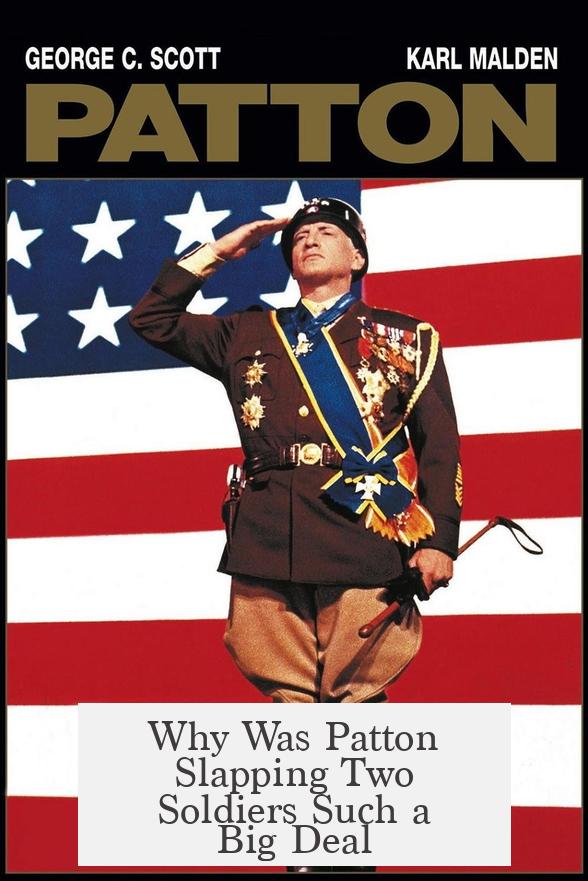
Patton’s slapping two soldiers was a huge deal because it exposed a brutal clash of wartime leadership styles, misunderstandings about combat trauma, and stirred public controversy that threatened military morale during World War II. The events revealed not only the personal flaws of a famous general but also how the U.S. Army grappled with unseen psychological wounds of war.
Let’s unpack this explosive episode, its context, and why it resonated far beyond the battlefield.
The Incidents: More Than Just Slaps
On two separate occasions in 1943, General George S. Patton physically confronted American soldiers suffering from battlefield trauma. These weren’t trivial slaps on the wrist but aggressive outbursts with serious consequences. The soldiers at the center were Pvt. Charles H. Kuhl and Pvt. Paul G. Bennett.
Kuhl had endured a brutal artillery barrage near Nicosia in Cyprus. His unit lost over half its men, and he was evacuated with severe medical issues: battle neurosis (what we now recognize as PTSD), malaria, starvation, fever over 102 degrees, and possible sepsis. Despite having real wounds—untreated, infected shrapnel injuries—Kuhl told Patton he “couldn’t take the shelling anymore.” Instead of sympathy, Patton’s reaction was harsh. He slapped Kuhl, called him a coward and “yellow-bellied bastard,” dragged him in full view of hospital staff, and kicked him out from the place of wounded heroes.
In a week, Patton repeated this harsh treatment with Bennett, a man in acute shock after carrying the remains of his childhood friend. Bennett was dehydrated, feverish, incoherent, and in such distress that he couldn’t control basic bodily functions. Patton shouted at him, accused him of cowardice, drew his pistol, hit him, pointed the gun at his head, and struck him again with the pistol butt until Bennett fell to the floor. Then, Patton ordered Bennett back to duty immediately.
These weren’t isolated episodes of lost temper. The violence was public and severe—more than just a slap, it was a physical and verbal humiliation of traumatized soldiers.
Patton’s Belief System: A Toxic Mix
The severity of Patton’s actions makes more sense when you look into his mindset. He didn’t believe in what we now understand as PTSD. To him, these “nervous disorders” were cowardice, plain and simple. In fact, he went so far as to categorize soldiers suffering from nervous conditions as threats to morale and even called for them to be shot for cowardice. Here’s a glimpse from a directive he issued to the Seventh Army in August 1943:
You should put this into context: “Such men are cowards… Those who are not willing to fight will be tried by court-martial for cowardice in the face of the enemy.”
This belief wasn’t some private grumble; it shaped how Patton treated soldiers like Kuhl and Bennett. He saw their psychological wounds as moral failings. No remorse followed. In his private diaries, Patton later wrote about Bennett, “I likely saved Bennet’s soul, if he had one.”
Why Did This Spark Public Outrage?
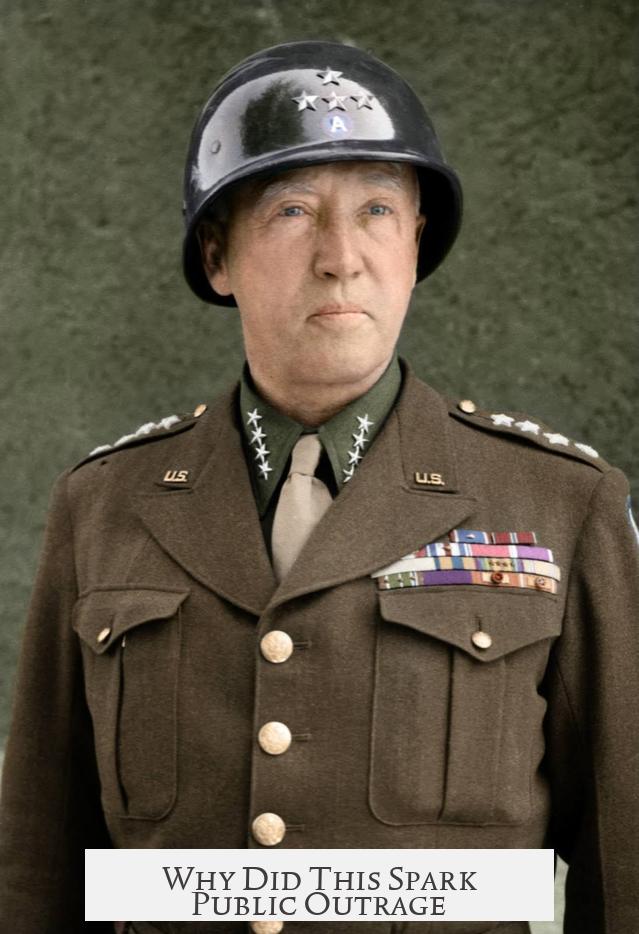
Initially, the press and military leadership kept the incidents quiet. The American press prioritized morale during the war and agreed not to report Patton’s brutal actions. A Saturday Evening Post reporter assured Eisenhower, “We’re Americans first and correspondents second,” fearing the news would make every mother worry about her son.
But newspaper giants Drew Pearson and Ernie Pyle broke the silence by reporting on the slapping scandal in late August 1943. The public reacted strongly. The outraged American people, fueled by news of their revered general physically abusing fragile soldiers, demanded answers.
This scandal cracked open the debate over military leadership, psychological trauma, and how soldiers were treated under extreme stress. The media coverage was relentless. Suddenly, Patton’s star was dimmed, even if reluctantly.
Eisenhower’s Dilemma and Response
General Dwight D. Eisenhower faced a tough call. Patton was one of the most brilliant commanders in the Allied forces—removing him outright could risk strategic setbacks during critical campaigns. Yet, leaving Patton unpunished would further damage morale and public confidence.
So, Eisenhower demanded a public apology from Patton. He made him personally apologize to the men and the hospital staff. Privately, Eisenhower chastised Patton in a firm letter.
Then came the strange but clever solution: Patton was sidelined by being put in charge of a “phantom army” in Operation Fortitude—an elaborate deception plan to mislead Nazi forces. Patton was active but away from a combat command, a move to keep his talents in play while cooling off the controversy.
Why Was This a Big Deal Beyond the Immediate Incidents?
The slapping scandal isn’t just about a general losing his temper. It highlights profound issues:
- Early misunderstandings of combat trauma: Battle neurosis was real and deadly, yet Patton saw it as cowardice. This reflects how little the military, and society, initially understood PTSD.
- Leadership styles under pressure: Patton embodied the old-school, brutal commander archetype—tough love which crossed into physical abuse. His style ignited debate on how to balance discipline and compassion.
- Media’s role and morale management: The press’s initial cover-up shows wartime censorship aimed at preserving morale, but exposing the truth later intensified public scrutiny.
- Military politics and strategy: Eisenhower’s handling of Patton reveals how critical military figures can evade full accountability when their strategic value is deemed too high.
What Can We Learn From This Historical Episode?
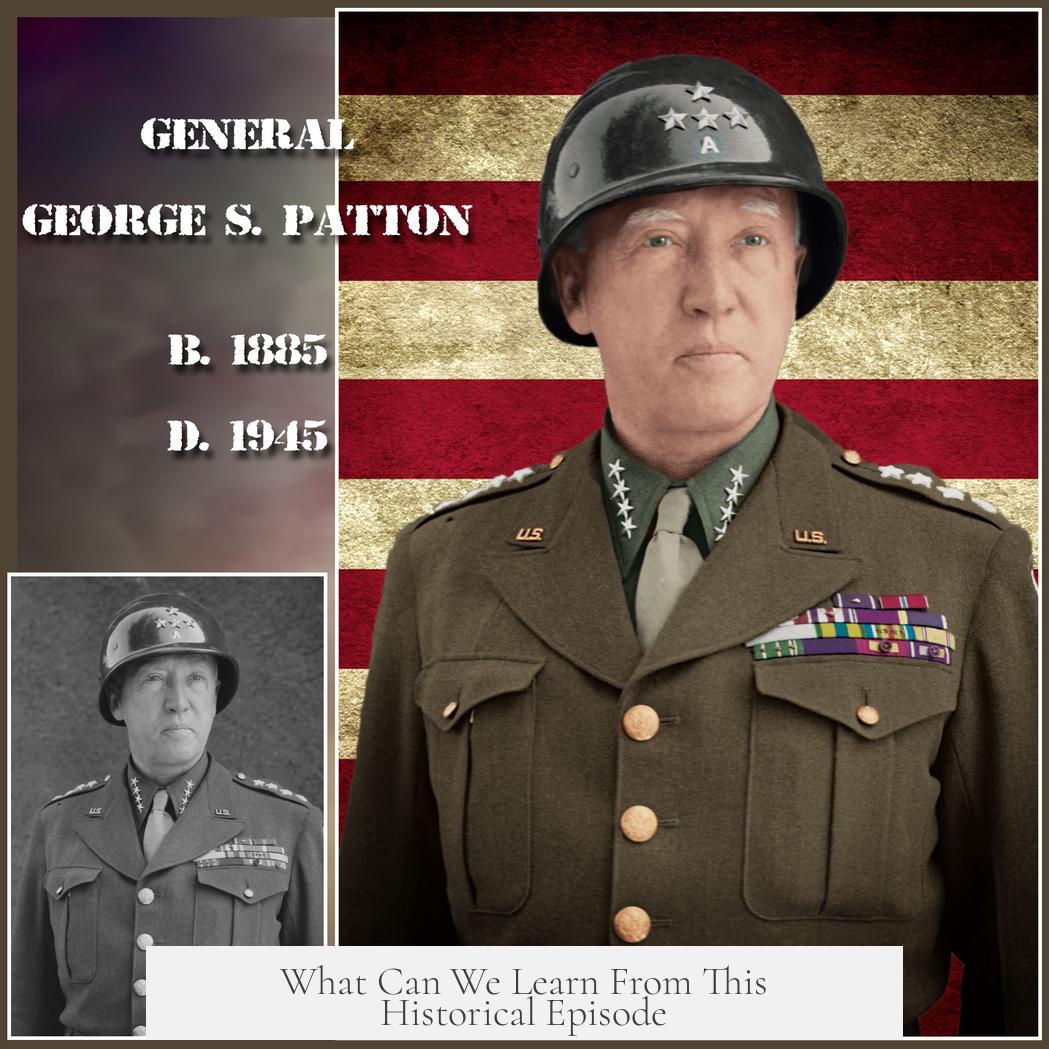
This scandal offers practical insights even today:
- Understanding Trauma: Leaders must recognize psychological injuries as genuine and serious. Ignoring or stigmatizing them can have deadly consequences.
- Discipline vs. Compassion: Military discipline is vital, but it must never justify physical or emotional abuse. Respect for vulnerable soldiers is key to long-term morale.
- Transparency Matters: Trying to suppress difficult truths may backfire. Honest communication, balanced with morale concerns, builds trust.
- Leadership Accountability: No matter how talented or important a leader is, abusing power cannot be overlooked.
The Enduring Legacy of the Slapping Incident
Patton remains a towering iconic figure in military history, celebrated for brilliance, daring, and tactical genius. Yet this episode stains his legacy. It forces us to confront the human cost of war—not just the physical toll but the psychological agony.
Why was Patton slapping two soldiers such a big deal?
Because it shattered illusions about war, exposed the limits of brute force leadership, and sparked a necessary conversation about trauma. It was a clash between old military values and emerging realities of psychological science and human dignity.
Would today’s military allow such behavior? Almost certainly not. The incident serves as a reminder: even the greatest generals have faults, and humility is crucial in leadership.
Next time you watch a war movie, imagine the real battles soldiers fought—not just with the enemy, but within their own minds—and how few commanders recognized their struggles.
